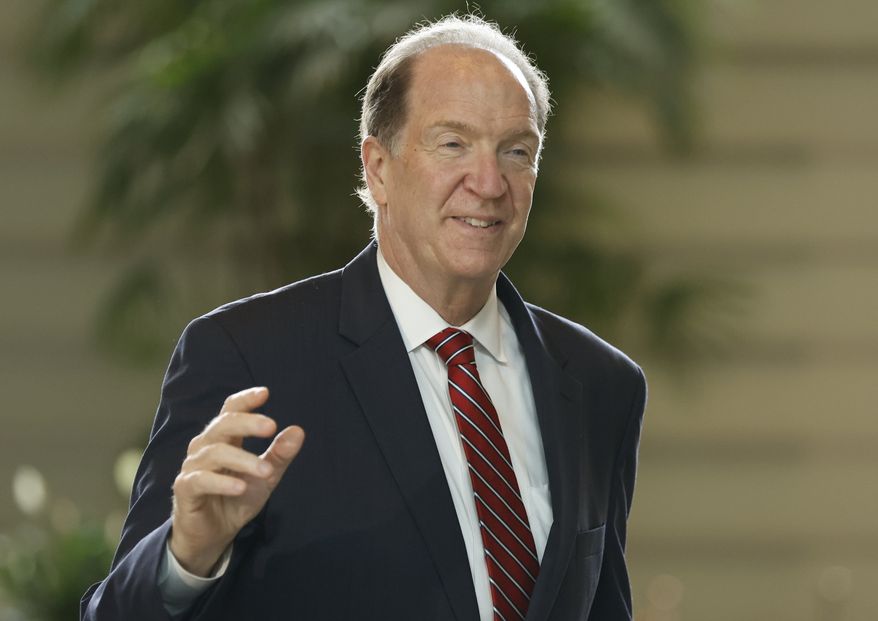Which is the correct statement: A. Almost all of the current global warming is caused by human activity. B. Human activity is having a minor effect on climate change. C. No one precisely knows how much of the current warming is caused by man? The correct statement is of course “C,” but the politically correct one is “A.”
The president of the World Bank, David Malpass — who is a very fine economist but not an environmental scientist — made an unforgivable error this past week by admitting he did not precisely know how much of the current global warming is caused by man while acknowledging it would certainly be prudent to take all reasonable measures to reduce CO2 emissions. The Malpass answer was not good enough for the environmental extremists and their political and media toadies, so the demands went out: “Off with his head!”

Speaking the truth or exhibiting skepticism about the prevailing orthodoxy has always been dangerous. One is reminded of the religious wars of the 15th and 16th centuries where in parts of Europe more than a third of the population was killed over theological disputes just among Christians. Fortunately, the religious wars seem to be largely behind us, except in certain Muslim countries where not wearing a headscarf properly is good enough for some to kill a young woman, as happened in Iran a couple of weeks back.
So far, I have not seen any reports of demands for Mr. Malpass to be killed, but only fired in disgrace. No surprise, one of the leaders of the “get Malpass gang” is Al Gore. For more decades than we care to recall, Mr. Gore has been telling us that the Earth is going to end the next day, or at least the day after, if we do not financially support one of the environmental initiatives that often just happen to enrich him.
A whole cottage industry of the “errors of Al Gore” has grown up that can be easily found on the internet. For many years, Mr. Gore has announced that the Arctic Ocean will be free of sea ice several years in the future — these dates come and go, the sea ice is still with us, but the press is too polite to mention that Mr. Gore is a fraud. The ever-predictable fool John Kerry joined in with the attempted lynching — bringing rope from one of his yachts on one of his private planes — to tell us once again (because he is of pure thought) that the fact that he produces many times the CO2 of the rest of us is of no importance.
As noted, Mr. Malpass is a very good economist, which in part means that he understands that there are many things we do know with certainty. One of the first things that students of economics learn is the law of supply and demand — if the price rises, the quantity demanded falls and vice versa. What is often not known beforehand is the precise change in quantity demanded from any given price change — thus Mr. Malpass was responding to an environmental question as any good economist would have.
Fortunately, there are many good environmental scientists who are also good economists, one of whom is Roger Pielke Jr., who has done much excellent work. He has just presented a new study, which gives us a better understanding of the relative costs of major hurricanes. His “normalized model” suggests that the Great Miami hurricane of 1926 would cost $266 billion today, followed by the Galveston hurricane of 1900 with a today cost of $153 billion, and Hurricane Katrina, which hit New Orleans in 2005, with a current cost of $129 billion, and finally Hurricane Andrew in 1992, which also hit near Miami and would cost $118 billion today.
News folks will often make statements like “the most expensive hurricane, or flood, or drought, or earthquake on record” without adjusting for changes in population, numbers of new structures, and so forth. Florida makes an interesting case. It has grown from a very low-population state a century ago (when my great-grandfather first moved to the Tampa Bay area) to the third most populous state in the country. If a hurricane the size of Ian hit Southwest Florida in 1922, it would have done relatively little damage, because so few people lived there and there was little infrastructure to be destroyed.
Mankind has suffered greatly from attacks on or intimidation of truth-tellers. Most recently, we were told by U.S. government officials that the COVID vaccines would prevent one from getting COVID and were perfectly safe. Both statements and many other statements from the CDC and government experts like Dr. Francis Collins and Dr. Anthony Fauci turned out to be dead wrong, and in retrospect cost many tens of thousands of lives. Other scientists and medical doctors who presented a contrary view or skepticism were attacked both by government officials and media know-nothings. The economic and psychological damage, particularly to young students because of the mistakes of government officials, may turn out to be the costliest disaster in history.
We should be applauding rather than damning people like Mr. Malpass who recognize the limits of knowledge and voice a bit of skepticism. If only Mr. Gore and Dr. Fauci had been as wise and responsible.
• Richard W. Rahn is chairman of the Institute for Global Economic Growth and MCon LLC.
https://www.washingtontimes.com/news/2022/oct/3/gore-kerry-go-after-world-bank-president-malpass-o/
© Copyright 2022 The Washington Times, LLC.